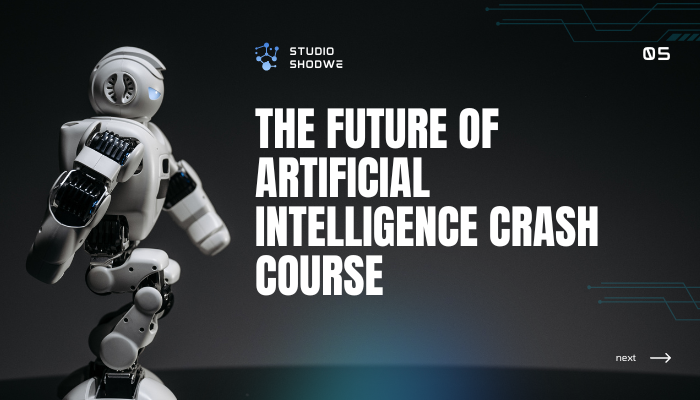Artificial Intelligence (AI) has quickly evolved from a specialized field of study to a disruptive force influencing nearly every industry. The potential of artificial intelligence (AI) to completely transform our way of life, employment, and interactions with the outside world is becoming more and more clear as the twenty-first century goes on. This intensive course on the future of artificial intelligence will examine the technology’s trajectory, possible uses, and related ethical issues.
1. A Synopsis of Artificial Intelligence
Artificial Intelligence (AI) is the programming of machines to mimic human thought processes and learning. These systems are made to carry out operations like speech recognition, visual perception, decision-making, and language translation that ordinarily call on human intelligence.
The most popular type of AI is called artificial narrow intelligence (ANI), and it is created to carry out a single task. Streaming platform recommendation engines, driverless cars, and voice assistants like Siri are a few examples.
Artificial General Intelligence (AGI): This is the concept of a machine that can think like a human and be able to comprehend, learn, and use intelligence in a variety of fields. Though it’s still speculative, many AI researchers see artificial general intelligence (AGI) as their ultimate aim.
Artificial Superintelligence (ASI): ASI exhibits higher levels of creativity, problem-solving skills, and emotional intelligence than human intelligence in all domains. The prospect of ASI presents serious existential and ethical issues, even though it is still a science fiction notion.
Big Data: The proliferation of AI has been driven by the availability of enormous volumes of data. Artificial intelligence (AI) systems can be trained to identify patterns and generate predictions with greater accuracy as more data is produced.
Computational Power: The development and use of increasingly sophisticated AI models has been made possible by the exponential increase in computational power, mainly due to the usage of GPUs and cloud computing.
AI on the Cloud: As AI is more thoroughly incorporated into cloud platforms, enterprises and developers throughout the globe will have access to cutting-edge AI capabilities. The democratization of AI is spurring innovation in a number of different sectors.
Big Data: The proliferation of AI has been driven by the availability of enormous volumes of data. Artificial intelligence (AI) systems can be trained to identify patterns and generate predictions with greater accuracy as more data is produced.
Computational Power: The development and use of increasingly sophisticated AI models has been made possible by the exponential increase in computational power, mainly due to the usage of GPUs and cloud computing.
AI on the Cloud: As AI is more thoroughly incorporated into cloud platforms, enterprises and developers throughout the globe will have access to cutting-edge AI capabilities. The democratization of AI is spurring innovation in a number of different sectors.
Education: By adjusting learning activities to meet the needs of specific pupils, AI is poised to customize education. By evaluating a student’s strengths and shortcomings, AI-powered technologies can provide individualized learning resources and pathways. Better student achievements and more efficient educational institutions may result from this.
AI is transforming the creation and consumption of entertainment and media content. Based on user preferences, AI algorithms are used to promote material, while AI-generated content—such as music and art is evolving in sophistication. AI might become more involved in content creation in the future, from film editing to scriptwriting.
Environmental Sustainability: AI can help with some of the most important environmental issues that the world is currently facing. For example, AI can optimize energy usage in smart grids, predict natural disasters.
AI’s Social and Ethical Consequences
As artificial intelligence (AI) becomes increasingly pervasive in our daily lives, significant ethical and societal issues are brought to light that need to be addressed to ensure responsible AI development and application.
Job Displacement: The possibility of AI replacing jobs is one of the main worries surrounding the technology. While AI can open up new possibilities, it can also make some employment obsolete, especially in sectors where routine activities are essential. The workforce needs to be educated and trained in order to be ready for this change.
Fairness and Bias: The quality of AI systems depends on the data they are trained on. The AI is likely to generate biased results if the data is biased. This has the potential to maintain current disparities and prejudice, especially in contexts such as employment, law enforcement.
Privacy Issues: There are a lot of privacy issues when using AI for data processing. Large volumes of personal data can be processed by AI systems, which may be misused or provide illegal access. Ensuring confidentiality and setting precise rules for data use will be essential.
Autonomous Weapons: The development of AI-powered weaponry is a serious risk to international peace and security. These autonomous decision-making systems create moral and ethical quandaries since they can decide between life and death without human input. International laws to stop the creation and application of autonomous weapons are becoming more and more popular.
Existential concerns: It is impossible to overlook the existential concerns associated with the possibility of Artificial Superintelligence (ASI). If AI were to surpass human intellect, it could potentially act in ways that are destructive to humanity.
Getting Ready for a Future Driven by AI
It seems obvious that artificial intelligence (AI) will become more and more integrated into our daily lives. Governments, corporations, and individuals must all take a diverse approach to preparing for this future.
Education and Training: People will need to pick up new skills and information if they want to survive in an AI-driven future. To guarantee that the workforce is prepared to adopt new technologies, governments and educational institutions must place a high priority on STEM (Science, Technology, Engineering, and Mathematics) education and encourage lifelong learning.
Development of Ethical AI: Organizations creating AI must give ethical issues top priority and make sure their systems are just, open, and responsible. This includes addressing issues like bias, privacy, and the possibility for misuse.
